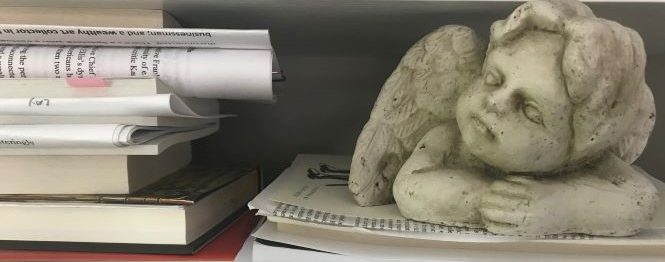I just finished reading The Great Fortune, the first book in Olivia Manning’s Balkan Trilogy. I wrote about this now overlooked classic last summer. It was an intended season’s read, but, as my reading life goes, other books nudged themselves in between me and Manning’s great work. I’m not here to write about the trilogy again, instead to share that the first book in the series became the perfect novel to read in bed before turning out the light, a delightful story that neither kept me up nor put me to sleep. This deeply gratifying novel gradually drew me into the social world of newlyweds Guy and Harriet Pringle, their first year together in Bucharest, where Guy is a lecturer in English Literature. Many may recall this story from the BBC production in the 1980s. I’m lucky to have the next two Manning novels to keep me company these cold, gray winter months.

The Balkan Trilogy reminds me of the more recent The West Country Trilogy by Tim Pears, with similarities in the inviting tone, atmosphere, and protagonist Leopold Sercombe. “To each horseman his own voice,” Pears writes in the first book, one of those sentences you don’t forget in praise of the individual. I can’t help myself bringing up The West Country here, as it’s a favorite of mine.
If a trilogy feels like too much of a time commitment right now, below you’ll find a handful of new books to be released in January and February. They’ve caught my interest, for one reason or another, and I thought I’d share them with you, what I’m hoping are the fabulous new ones.

In His Own Image is a slim novel (192 pages) described by the publisher as “a bewitching story of passion, death, and love, and a powerful reflection on the ambiguous relationship between art and reality.” Young Antonia is given a camera when she’s 14 years old, and her talent and love for photography blossoms. It also leads to a career in photojournalism. A little more than two decades later, after an accidental death, her uncle, a priest and the one who gave her the camera, officiates at Antonia’s funeral, reflecting on her life. Kirkus Reviews in their forecast writes: “Whether or not Antonia’s uncle serves in some divine capacity, the story his gift sets in motion provides [Jérôme] Ferrari with an opportunity to explore the limits of human love and suffering.” Much here to tempt, as Kirkus concludes its starred praise referring to the author’s “stunning narrative.” (January)

In this psychological, literary thriller, a man resuscitates a drowning famous art dealer and becomes convinced that their fates are entwined, according to the publisher’s description. The art dealer doesn’t recognize the younger man who saved him when he enters his Beverly Hills gallery, and yet the dealer takes him under his wing for the potential he sees. Kirkus Reviews says Mouth to Mouth is “a story within a story about chance encounters and the ways that they can alter lives forever.” It also says, “[Antoine] Wilson wraps some big questions in this page-turner: Is destiny something that merely happens to us? Or can we manipulate it to great—or devious—ends?” Things go wrong, and there’s a “staggering ending,” all of which sound perfect for both a gloomy winter day or a beach chair escape, wherever you may be. (January)

Yonder takes place in the American South, with Cato and William meeting on a plantation ruled by the tyrannical Cannonball Greene. William finds himself falling in love with Margaret, and Cato hurts over his first love, Iris, who was sold off with no forewarning. From the publisher’s description: “Jabari Asim presents a beautiful, powerful, and elegiac novel that examines intimacy and longing in the quarters while asking a vital question: What would happen if an enslaved person risked everything for love?” A visiting minister “with a mysterious past” gives the slaves “ideas about independence” and lays before them the prospect of following him into the unknown. Both Publishers Weekly and Kirkus Reviews give the novel their high-praise stars, with the latter claiming, “Asim demonstrates all a novel can be: soaring and grounded, personal and epic, thrilling and quiet.” That certainly makes this book hard to resist. (January)

Here’s a unique spin on storytelling: Hugo Hamilton’s novel The Pages is narrated by a book, that being Joseph Roth’s 1924 triumph, Rebellion. The drama begins with the book/narrator tucked inside the hand luggage of Lena Knecht, a New York artist traveling to Berlin to discover the meaning of a hand-drawn map inside the book. She’s inherited this first edition of Rebellion from her father who inherited it from his father who saved it from the May 1933 book burning in Berlin’s Opera Square. Much going on here as we follow Lena and the book in the present day in Germany, along with the narrator’s recollection of its survival from the Nazis and the story of the doomed marriage of its creator, Joseph Roth, and his beloved Friederike. Overarching is the narrator’s observations and philosophies about books and concern for repeating the past. Author Colm Tóibín says The Pages is “ingenious and engaging,” in The Guardian. (February)

Ecco/HarperCollins is reissuing the collected short stories of Johanna Kaplan originally published in 1975 as Other People’s Lives. It won high praise and became a finalist for the National Book Award for Fiction. In this new edition of the collection, now titled Loss of Memory Is Only Temporary, two new stories and an introduction by author Francine Prose are added. The era for these stories is mainly Jewish New York in the decades after World War II, but the publisher assures us that Kaplan’s vibrant characters and their circumstances remain relevant and entertaining. The description claims the stories resonate with universal significance and offer depth, surprise and humor, thanks to heroines who are “fierce, tender, funny, and cuttingly smart.” Last year, I enjoyed Hilma Wolitzer’s collection Today a Woman Went Mad in the Supermarket. She’s another 20th century author whose 1970 short stories found renewed publication, giving me high hopes for Johanna Kaplan. (February.)

This fusion of fact and fiction by Maud Casey takes as its premise 19th century women confined to Paris’s Salpêtrière hospital, where they were diagnosed as hysterics and studied by the celebrated neurologist Jean-Martin Charcot and his colleagues. The women are reimagined in linked prose portraits, accompanied by period photographs and medical documents both authentic and invented, according to the press release. It also says the portraits poignantly restore the humanity to the 19th century psychiatric patients. City of Incurable Women in my hand, flipping through the mere 128 pages, fascinates. It is the kind of enticing gem its publisher, Bellevue Literary Press, so often delivers, such as novels by Andrew Krivak, The Bear and The Sojourn. Publishers Weekly says, “[City of Incurable Women] defies convention and revels in searing, gorgeous language. In fact, this is worth reading twice.” (February)

I’ve been reading Mouth to Mouth today and it’s riveting. Almost at the end which I’m saving for tomorrow. The Casey sounds heart wrenching. It’s reminded me of Elaine Showalter’s The Female Malady.
LikeLiked by 1 person
I’m glad to hear this about Mouth to Mouth. I’m eager to read it. And I love that you’re saving the ending for tomorrow. I’m not familiar with the Showalter but I’m intrigued and will check into it.
LikeLiked by 1 person
Mouth to Mouth sounds very interesting.
LikeLiked by 1 person
It does indeed. Susan Osborne’s comment makes it even more so!
LikeLike